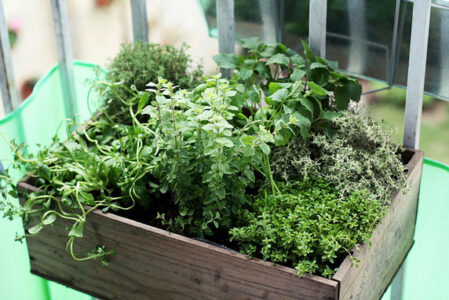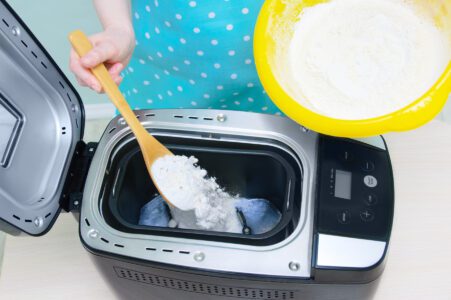There are many reasons for living in the city but being close to nature isn’t usually one of them. Parks exist but very few backyards or grassy knolls come with homes, especially those on the 22nd floor of an apartment building.
That’s why adding your own little greenery in the form of a balcony herb garden can make all the difference.
Photo By Suzette Pauwels/Flickr
Why Herbs?
While there are many types of plants to choose from, herbs can last throughout the year and aren’t just nice to look at but have many uses and benefits that make them all the more appealing. For instance:
• Scent: Most herbs have distinct scents, which makes them easily recognizable. When essential oils are extracted from various herbs and applied to skin their aromas can be healing and energizing. Theses scents can also naturally ward off unwanted insects, so using their oils can be beneficial when going for a walk in the evening when it’s prime mosquito time.
• Taste: Herbs play a major role in giving food such great flavor, so having a variety of fresh ones to choose from just a few steps away can make exploring culinary interests that much easier. Also, it feels great to know you’ve cooked with your own herbs.
• Convenience: When you’re in the middle of cooking and herbs are growing on the balcony, picking a few leaves or branches is more convenient than running down to the local market.
• Savings: Herbs often cost several dollars for a small package or bushel that rarely gets used up. Growing your own means cutting down the weekly budget and only picking what you need.
• Low-maintenance: Herbs require minimal care and won’t suffer from insect infestations because most pests dislike them. While each has different needs, give them a little water and sun and they’ll be fine.
• Medicinal benefits: Herbs have medicinal qualities and can help treat many illnesses from stomach viruses to cuts and headaches.
Choosing Herbs for Your Balcony Herb Garden
When choosing herbs try starting with familiar ones such as parsley, sage, basil, rosemary, thyme and perhaps lavender. Their familiarity will give you opportunities to actually use them and then branch out to others.
As for care, some need to be fed more than others so do a little research before treating them all equally, and when you water them know that like many other plants herbs don’t like their leaves wet, so aim for their base near the roots.
Also, depending on the climate you live in, some herbs can withstand harsh winters and others can’t, so learn which ones suit your region best and keep a little space available inside for those you may want to protect when the cooler air moves in.
Note: In most cases starting herbs from scratch can be timely as many seeds take more than a month to germinate and show signs of life. Instead, buying already sprouted seedlings is probably more beneficial and will get the balcony herb garden going faster.
Starting with Containers
After you’ve decided which herbs to grow and how many of each you want, the next decision is finding the right containers to fit the space. After all, the balcony still needs to remain comfortable to sit in without feeling cramped, so whatever space is available you’ll want to use wisely.
One consideration is making sure containers are secured to the balcony so the safety of anyone passing below isn’t compromised. For instance, if placed on the floor, make sure containers are not too close to the ledge where they could get pushed over easily; that if hung from the ceiling or wall, the mechanism they hang from is fastened tightly into the building; and if attached to the railing, make sure it’s strong enough to hold all the weight.
Furthermore, if you’re interested in hanging pots but not sure how to properly secure them, find a trusted handyman who can do it for you. Just make sure the landlord or building will allow these minor cosmetic changes.
Finally, once a decision has been made on the container’s size and placement, they can either be purchased at local home improvement stores, found at neighborhood moving sales, or made by reusing empty containers from food or other items. Buying herbs already in permanent containers is an option but more expensive than getting a few from a nursery and transplanting them later.
Jakob Barry is a green living journalist for Networx.com. From landscapers to flooring contractors Networx simplifies the process of locating a reliable professional.







